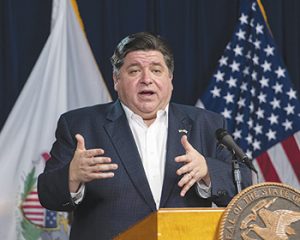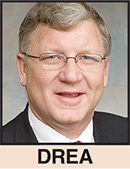By CARL GREEN
Illinois Correspondent

Springfield, IL – Illinois’ new Workers’ Compensation rule protecting essential workers affected by COVID-19 is moving ahead despite drawing opposition from some businesses.
The new rule – a major priority of the Illinois AFL-CIO – provides that workers who say they contracted the virus because of their jobs will be presumed to be telling the truth, ensuring they will get benefits.
Backers say it protects the workers who are most affected by the virus, including emergency and health care workers. Business opponents say it is a major new expense.
The Illinois Workers Compensation Commission approved the “rebuttable presumption” ruling for the next 150 days, with support from the AFL-CIO and Gov. J.B. Pritzker.
The rule covers all workers designated as “essential,” including health-care workers, police and fire personnel, corrections officers, grocery store workers, food producers and postal workers.
‘WE OWE THEM’
“We owe them a debt that we can never fully repay, but to start, we can give them the peace of mind to know they will be covered if they fall ill on the job,” Pritzker said.
 “The Illinois AFL-CIO and its union affiliates have been fiercely advocating for more protection for workers since the beginning of the pandemic,” Illinois AFL-CIO President Tim Drea said. “Many of our members continue to go to work, on the frontlines of the pandemic, without the necessary personal protective equipment and other adequate safety measures.”
“The Illinois AFL-CIO and its union affiliates have been fiercely advocating for more protection for workers since the beginning of the pandemic,” Illinois AFL-CIO President Tim Drea said. “Many of our members continue to go to work, on the frontlines of the pandemic, without the necessary personal protective equipment and other adequate safety measures.”
 Drea said the Illinois AFL-CIO has been advocating both to assure compensation and benefits for displaced workers and safe conditions for workers on the front lines.
Drea said the Illinois AFL-CIO has been advocating both to assure compensation and benefits for displaced workers and safe conditions for workers on the front lines.
Alice Johnson, executive director of the Illinois Nurses Association, said her members are suffering from doing their jobs and need this support.
“Nurses in Illinois are getting sick and infected,” she said. “Sadly, we have seen some employers argue with nurses about when they became infected, completely ignoring the obvious risk created by the work that they do every day.”
BUSINESS GROUPS CITE COST
Nine Illinois business groups, including the Manufacturers Association, Retail Merchants Association and the Hotel and Lodging Association, joined to oppose the measure, saying: “This commission chose to suddenly impose a drastic policy change that will significantly increase costs and require employers to pay for medical expenses and salary benefits if an employee is diagnosed with COVID-19 without proof the illness was contracted at the workplace.”
Pritzker replied: “In the midst of an emergency, the only way you have to operate is to protect people as best you can. To the extent that someone has to pick up the tab for that, sometimes that will fall on the people who are most able to pick up the tab.”
Drawing the ire of state Republicans, Pritzker extends stay-at-home order in Illinois
Springfield, IL – Illinois Gov. J.B. Pritzker recent extension of the statewide stay-at-home order through May 31 amid the ongoing threat of COVID-19 infection, has drawn the ire of two Republican state legislators, who seized the opportunity to join the party’s national effort to end precautions against the virus, including the many protests supported by national Republican groups.
Rep. Darren Bailey, from tiny Xenia, sued Pritzker in Clay County, and a local judge ruled in his favor, saying Bailey did not have to abide by the stay-at-home order, but declining to extend the ruling to anyone other than Bailey. Rep. John Cabello, a Rockford-area police officer, filed his own suit against Pritzker’s rules last week, seeking a statewide decision. That suit is set for a hearing on Aug. 6.
UNDETERRED
Pritzker’s announcement reset the rules for Illinois’ fight against the coronavirus, extending the stay-at-home order and requiring face masks in public places such as grocery stores starting May 1.
“We have the opportunity to prevent the pain of loss from touching the lives of thousands,” Pritzker said. “The stay-at-home order is working, so to remove it entirely would be to simply open everything back up to infection.”
ILLINOIS REQUIREMENTS
Under the extended stay-at-home order:
- Face masks must be worn by anyone over two-years-old in public places and shops that cannot maintain a six-foot distance between people, starting May 1.
- Manufacturers and other businesses considered essential must provide face coverings to employees who cannot maintain six feet of distance. Occupancy rules will be in place, and manufacturers must stagger shifts and operate only lines considered essential.
- Retail stores that aren’t on the essential list may open for phone or online orders only, to be delivered or picked up outside.
- Hospitals may now reschedule and perform procedures that had been postponed, as long as capacity remains to treat COVID-19 patients. This includes MRIs, mammograms and colonoscopies, among others.
- Certain state parks will be allowed to re-open under distancing rules.
- Greenhouses, garden centers, nurseries and animal groomers may re-open as essential businesses, following distancing rules and requiring employees and customers to wear face coverings.
STATE PARKS
Among the parks to be re-opened are Giant City, Fort Massac, Forbes and Wayne Fitzgerrell in southern Illinois and, among others, Eldon Hazlet, Sangchris Lake, Eagle Creek, Wolf Creek and Clinton Lake. The Department of Conservation has the full list online. The main state park in the Metro-East area, Pere Marquette, west of Alton, was not among those scheduled to re-open.

